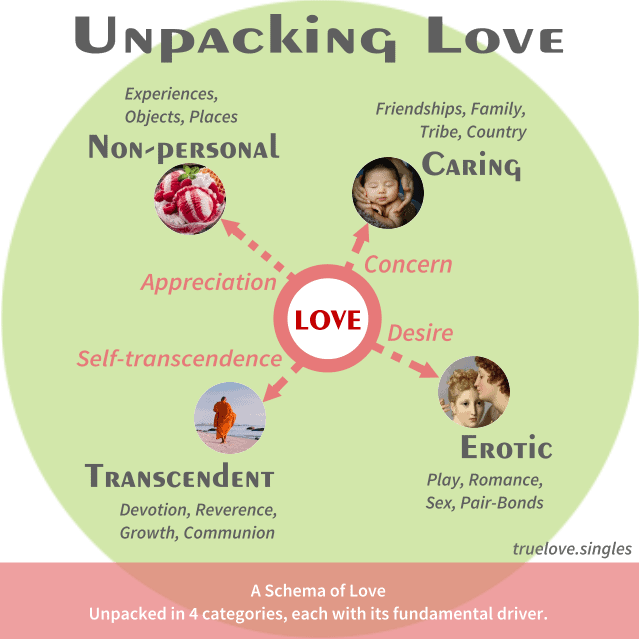Let’s understand ‘love’ as an unfolding—much like a process such as the weather—and not as a fixed thing to be defined. Yet, unpacking this mysterious phenomenon allows us to grasp its overarching four domains.

1. Non-personal Love of Things
Ever watched a car commercial on TV? Yes, there are plenty of goods to appreciate such as experiences, objects, and places. We take them into our world by loving them. Sex itself is such an experience. Unfortunately, other persons also might end up just being treated as a ‘thing.’ However, nobody but perhaps a Hollywood star likes to be objectified. Nobody but perhaps a pet likes to be possessed. We are not fooled by the love of things.

2. Love as Caring
Caring, of course, comes in a variety of modes. From ‘love yourself’ to the biblical ‘love your neighbor as yourself,’ we all concern ourselves. That is, we surely want to be cared for, and − with that in mind − we make sure to keep the younger generations alive. Caring, then, benefits all, even the caregiver, and at least those close enough. Caring − the obligatory love of agape, does not require genuine liking. Humans seem to be ambivalent as the old instinct of “us versus them” still informs our basic strivings.

3. Love as Transcendence
Many people practice acts of self-transcendence. Contemplation, meditation, and prayer help people find understanding and reverence for life and others. Christians hold that most human inspiration is divine and all nature a miracle. Buddhists commune, unimpeded by desires, as brothers and sisters altogether. The real and the imaginary are the interwoven planes upon which we construct our mostly hierarchical relationships with each other. Will we ever get beyond the phenomenal to the Kantian thing-in-itself? Perhaps not.

4. Love as the Amorous
One does not have to look so far as into bedrooms for the amorous or erotic. Passionate and caring pair-bonds come and stay alive in immanence thanks to amorous love, and less so to great sex. Yet this intimate or playful love − the unstable aggregate of individual passions − can quickly turn into disgust and strife. Still, we must give amorous love a chance. It births new life, that is, hopeful beginnings. It is what makes life possible and worth living. As creatures, we are no wallflowers but real flesh and bones.
“Consider how these 4 loves play out in relationship dynamics and see if you can recognize yourself or anyone you know in any of them.“

Click illustration to enlarge on desktop or tablet.